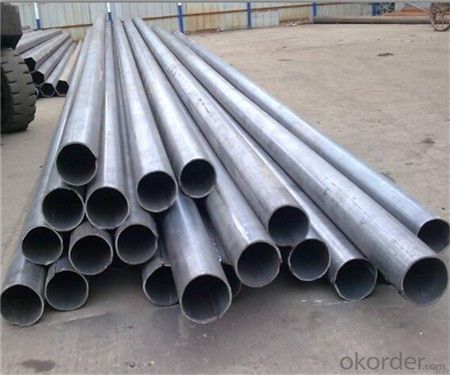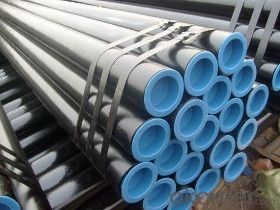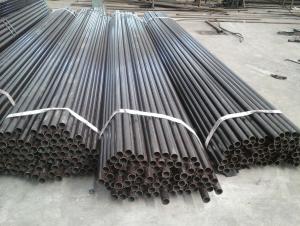Seamless Cold Drawn Tube
- Loading Port:
- China Main Port
- Payment Terms:
- TT or LC
- Min Order Qty:
- 25-35 m.t.
- Supply Capability:
- -
OKorder Service Pledge
OKorder Financial Service
You Might Also Like
1. Standard: GB,ASTM,DIN,JIS
2. OD:30-508mm,WT:4-100mm
3. Length:Max 12 m
4.Tolerance:OD<0.5%.WT<10%
Product Description
1. Commodity Name: Carbon Seamless steel pipe
2. Standard: API,GB,ASTM,ASME,DIN
3. Quality grade: 10#, 20#, A106B, A53B, API 5L B, Q235, Q345, ST37-2, ST 45, ST52.etc.
4. Dimension:
OD: 1/2"-24"
WT: 2.5-80mm, SCH10~SCH40~XXL
length: 5.8m,6m,8m,9m,12m
5. Technique: Hot Rolled/Cold Rolled/ Cold Drawn
6. Application
carbon seamless steel pipes are widely used in gas, water and oil, transpotation;constructions;Bridge,highway,windows of model steel door; building materials;fences;heating facilities Fluid Pipe;conduit pipe,scaffolding pipe.etc.
7. Payment Terms: L/C D/A D/P T/T
8.Packing and shipment
Packaged in bundles,as per customers' requirements, it can also bepackagesd as beveled ends, typed marking, black painting, plastic caps protection,woven bags packing
For 20" container the max length is 5.8m; For 40" container the max length is 12m. other options are available based on customer requests. Please discuss when placing orders.
Seamless Cold Drawn Tube Image


FAQ of Seamless Cold Drawn Tube
①How is the quality of your products?
Our products are manufactured strictly according to national and internaional standard, and we take a test
on every pipe before delivered out. If you want see our quality certifications and all kinds of testing report, please just ask us for it.
Guaranteed: If products’ quality don’t accord to discription as we give or the promise before you place order, we promise 100% refund.
②How about price?
Yes, we are factory and be able to give you lowest price below market one, and we have a policy that “ for saving time and absolutely honest business attitude, we quote as lowest as possible for any customer, and discount can be given according to quantity”,if you like bargain and factory price is not low enough as you think, just don’t waste your time.Please trust the quotation we would give you, it is professional one.
③Why should you chose us?
Chose happens because of quality, then price, We can give you both.Additionally, we can also offer professional products inquiry, products knowledge train(for agents), smooth goods delivery, exellent customer solution proposals.Our service formula: good quality+good price+good service=customer’s trust
SGS test is available, customer inspection before shipping is welcome, third party inspection is no problem.
Any question, pls feel free to contact us !
- Q:Are steel pipes resistant to fire?
- Yes, steel pipes are highly resistant to fire due to their high melting point and ability to withstand intense heat and flames.
- Q:What are the applications of steel pipes?
- Steel pipes have a wide range of applications in various industries due to their durability, strength, and versatility. Some of the common applications of steel pipes include: 1. Plumbing and water distribution: Steel pipes are commonly used in plumbing systems to transport water and other fluids. They are resistant to corrosion and can withstand high pressure, making them ideal for water distribution networks in residential, commercial, and industrial buildings. 2. Oil and gas industry: Steel pipes are extensively used in the oil and gas industry for the transportation of oil, natural gas, and other petroleum products. They are able to handle high-pressure and high-temperature environments, making them crucial in drilling, production, and refining processes. 3. Construction and infrastructure: Steel pipes are widely employed in construction projects for various purposes such as structural support, foundations, scaffolding, and underground piping systems. They provide a strong and reliable framework for buildings, bridges, tunnels, and highways. 4. Industrial applications: Steel pipes are used in various industrial applications such as manufacturing, power plants, chemical processing, and food processing. They are often used to transport liquids, gases, or slurries within the production processes or to transfer heat in heat exchangers and condensers. 5. Agricultural sector: Steel pipes are commonly used in the agricultural sector for irrigation systems, particularly in large-scale farming. They are used to transport water from a water source to the fields, ensuring efficient and controlled water distribution. 6. Mining industry: Steel pipes are utilized in the mining industry for the extraction and transportation of minerals, ores, and other mining materials. They are resistant to abrasion and corrosion, making them suitable for the harsh and demanding conditions of mining operations. 7. Mechanical and automotive applications: Steel pipes find application in the manufacturing of various mechanical components, such as automotive exhaust systems, hydraulic cylinders, and precision tubing. They offer high strength, dimensional stability, and resistance to impact and vibration. 8. Infrastructure and utilities: Steel pipes are commonly used in infrastructure projects for the transportation of sewage, stormwater, and wastewater. They are durable, resistant to chemical corrosion, and can withstand underground conditions, making them suitable for sewer and drainage systems. In summary, the applications of steel pipes are vast and diverse, ranging from plumbing and water distribution to oil and gas industry, construction, agriculture, mining, mechanical and automotive sectors, and infrastructure projects. Their robustness, versatility, and ability to withstand extreme conditions make them a fundamental component in numerous industries.
- Q:Welded and seamless steel pipe how to distinguish?
- Different processing technology:Seamless tubes are made of quality carbon steel or alloy steel. Processing technology of seamless pipe hot rolling and cold drawing is divided into two ways, and the tube is generally based on welded.
- Q:How are steel pipes used in the manufacturing of structural frameworks?
- Steel pipes are commonly used in the manufacturing of structural frameworks due to their strength, durability, and versatility. These pipes are used as components in the construction of frameworks, such as buildings, bridges, and towers, providing support and stability to the overall structure. Steel pipes are often used to create columns, beams, and trusses, which are essential for bearing heavy loads and ensuring the structural integrity of the framework. Additionally, steel pipes can be easily welded, allowing for efficient and cost-effective construction processes. Overall, steel pipes play a crucial role in the manufacturing of structural frameworks by providing a robust and reliable solution for various construction projects.
- Q:How do you repair a damaged steel pipe?
- To repair a damaged steel pipe, the first step is to assess the extent of the damage. Once identified, the damaged section can be cut out and replaced with a new piece of pipe. Alternatively, for smaller damages, patches or clamps can be used to cover the affected area. It is essential to clean and prepare the surface properly before applying any repair method, such as welding or epoxy. Seeking professional help is recommended for complex or extensive damages to ensure a safe and effective repair.
- Q:How are steel pipes used in the renewable energy industry?
- Steel pipes are commonly used in the renewable energy industry for various applications. They are used to transport fluids, such as water or steam, in geothermal power plants. Steel pipes are also used in solar thermal power plants for transferring heat transfer fluids. Additionally, steel pipes are utilized in the construction of wind turbine towers, providing structural support for the turbines. Overall, steel pipes play a vital role in the renewable energy industry by facilitating the efficient and reliable operation of different renewable energy technologies.
- Q:What is the difference between steel pipes and PVC-M pipes?
- The main difference between steel pipes and PVC-M pipes lies in their material composition. Steel pipes are made of steel, which gives them higher strength and durability. They are commonly used for high-pressure applications and in areas where the pipes may be exposed to extreme conditions or corrosive substances. On the other hand, PVC-M pipes are made of polyvinyl chloride modified with certain additives to enhance their impact resistance and toughness. They are lightweight, easy to install, and resistant to corrosion, making them suitable for various applications, including water supply, irrigation, and drainage systems. While steel pipes offer superior strength, they are more expensive and require regular maintenance, such as anti-corrosion treatments. PVC-M pipes, on the other hand, are more affordable, require minimal maintenance, and can be easily joined using solvent welding or mechanical fittings. In summary, the choice between steel pipes and PVC-M pipes depends on factors such as the intended use, budget, and environmental conditions.
- Q:Are steel pipes suitable for transporting gas?
- Yes, steel pipes are suitable for transporting gas. They have high strength and durability, making them capable of withstanding the pressure and stress involved in gas transportation. Additionally, steel pipes have excellent resistance to corrosion, ensuring the safety and integrity of the gas being transported.
- Q:How to descaling galvanized steel pipe?
- Is red rust or white rust, red rust is the base material rust, white rust is Zinc Coating Rust
- Q:What is the difference between carbon steel pipes and stainless steel pipes?
- The main difference between carbon steel pipes and stainless steel pipes lies in their composition. Carbon steel pipes are primarily made of iron and carbon, while stainless steel pipes contain iron, carbon, and a minimum of 10.5% chromium. This high chromium content in stainless steel pipes provides excellent corrosion resistance, making them suitable for various applications in industries like food processing, chemical, and oil & gas. On the other hand, carbon steel pipes are more cost-effective and have higher strength than stainless steel pipes, but they are more susceptible to corrosion and thus require regular maintenance and coating for protection.
1. Manufacturer Overview |
|
|---|---|
| Location | |
| Year Established | |
| Annual Output Value | |
| Main Markets | |
| Company Certifications | |
2. Manufacturer Certificates |
|
|---|---|
| a) Certification Name | |
| Range | |
| Reference | |
| Validity Period | |
3. Manufacturer Capability |
|
|---|---|
| a)Trade Capacity | |
| Nearest Port | |
| Export Percentage | |
| No.of Employees in Trade Department | |
| Language Spoken: | |
| b)Factory Information | |
| Factory Size: | |
| No. of Production Lines | |
| Contract Manufacturing | |
| Product Price Range | |
Send your message to us
Seamless Cold Drawn Tube
- Loading Port:
- China Main Port
- Payment Terms:
- TT or LC
- Min Order Qty:
- 25-35 m.t.
- Supply Capability:
- -
OKorder Service Pledge
OKorder Financial Service
Similar products
New products
Hot products
Related keywords






























